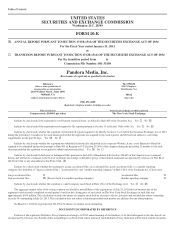Pandora 2012 Annual Report Download - page 19
Download and view the complete annual report
Please find page 19 of the 2012 Pandora annual report below. You can navigate through the pages in the report by either clicking on the pages listed below, or by using the keyword search tool below to find specific information within the annual report.
Table of Contents
Our competitors include:
Other Internet Companies. The market for online advertising is becoming increasingly competitive as advertisers are allocating increasing amounts of
their overall marketing budgets to web-based advertising. We compete for online advertisers with other internet companies, including major internet portals,
search engine companies and social media sites. Large internet companies with greater brand recognition, such as Facebook, Google, MSN and Yahoo! have
large direct sales staffs, substantial proprietary advertising technology, and extensive web traffic, and consequently enjoy significant competitive advantages.
Broadcast Radio. Terrestrial broadcast and to a lesser extent satellite radio are significant sources of competition for advertising dollars. These radio
providers deliver ads across platforms that are more familiar to traditional advertisers than the internet might be. Advertisers may be reluctant to migrate
advertising dollars to our internet-based platform.
Other Traditional Media Providers. We compete for advertising dollars with other traditional media companies in television and print, such as ABC,
CBS, FOX and NBC, cable television channel providers, national newspapers such as The New York Times and the Wall Street Journal and some regional
newspapers. These traditional outlets present us with a number of competitive challenges in attracting advertisers, including large established audiences,
longer operating histories, greater brand recognition and a growing presence on the internet.
Content, Copyrights and Royalties
To secure the rights to stream music content over the internet, we must obtain licenses from, and pay royalties to, copyright owners of both sound
recordings and musical compositions. These royalty and licensing arrangements strongly influence our business operations. In May 2011, we started
streaming spoken word comedy content, for which the underlying literary works are not currently entitled to eligibility for licensing by any performing rights
organization for the United States. Rather, pursuant to industry-wide custom and practice, this content is performed absent a specific license from any such
performing rights organization. We do, however, obtain licenses to stream the sound recordings of comedy content under federal statutory licenses as more
fully described under the section captioned "Sound Recordings" below, which in some instances we have opted to augment with direct agreements with the
licensors of such sound recordings.
Sound Recordings
Our largest royalty expense arises from our use of sound recordings. We obtain performance rights licenses and pay performance rights royalties to the
copyright owners of sound recordings, typically performing artists and recording companies, pursuant to the Digital Millennium Copyright Act of 1998, (the
"DMCA"). Under federal statutory licenses created by the Digital Performance Right in Sound Recordings Act of 1995, (the " DPRA"), and DMCA, we are
permitted to stream any lawfully released sound recordings and to make reproductions of these recordings on our computer servers, without having to
separately negotiate and obtain direct licenses with each individual copyright owner. These statutory licenses are granted to us on the condition that we
operate in compliance with the rules of statutory licenses and pay the applicable royalty rates to SoundExchange, the non-profit organization designated by the
Copyright Royalty Board, or CRB, to collect and distribute royalties under these statutory licenses. We believe we are not an "interactive service" as defined
in the U.S. Copyright Act of 1976 (the "U.S. Copyright Act"). As a non-interactive service, we are not allowed to stream a particular song "on-demand" and
are otherwise obliged to limit the ways in which we stream music to our listeners. As such we are required, among other things, to restrict the number of songs
that are played on a particular station from a particular artist or album within certain time periods.
The rates we pay to SoundExchange for non-interactive streaming of sound recordings pursuant to these licenses are privately negotiated or set by the
CRB. In 2007, the CRB set royalty rates for non-interactive, online streaming of music that were extremely high. In response to the lobbying efforts of
internet webcasters, including Pandora, Congress passed the Webcaster Settlement Acts of 2008 and 2009, which permitted webcasters to
8
























